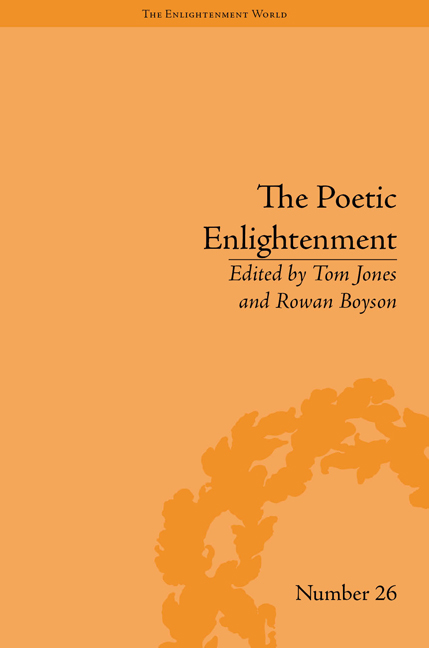Book contents
- Frontmatter
- CONTENTS
- Acknowledgements
- List of Contributors
- General Introduction
- I Poetic Knowledge and the Knowledge of Poetry
- 1 Introduction
- 2 Samuel Johnson and the Science of Literary Criticism
- 3 Prosody, Knowledge and Humanity in Enlightenment Language Science
- 4 Ferguson's School for Literature
- II Poetic Theories of the Social Self
- III Enlightenment and Romantic Poetologies
- Notes
- Index
3 - Prosody, Knowledge and Humanity in Enlightenment Language Science
from I - Poetic Knowledge and the Knowledge of Poetry
- Frontmatter
- CONTENTS
- Acknowledgements
- List of Contributors
- General Introduction
- I Poetic Knowledge and the Knowledge of Poetry
- 1 Introduction
- 2 Samuel Johnson and the Science of Literary Criticism
- 3 Prosody, Knowledge and Humanity in Enlightenment Language Science
- 4 Ferguson's School for Literature
- II Poetic Theories of the Social Self
- III Enlightenment and Romantic Poetologies
- Notes
- Index
Summary
Orientation
This is an essay on the role prosody plays in theories of language in France and Britain (particularly Scotland) in the mid to late eighteenth century. Prosody is understood in a variety of ways most of which are nonetheless captured by this general definition: a system of contrasts between syllables by means of duration, pitch or volume, observable in ‘ordinary’ usage, schematized in one way or another in ‘poetic’ usage. Eighteenth-century researchers into language took an interest in prosody, and had an intuition that early languages, or early forms of current languages, are characterized by a marked prosody. Loss of such markedness is often considered a loss of poetic energy, but a gain in the analytical capacity of language, with notable exceptions (Lord Monboddo, for example, regards the loss of variety in prosody as a diminution of the linguistic parameters available to mark cognitive distinctions). On the whole I shall use ‘cognitive’ to capture the view that language is primarily a means of referring to clear and distinct ideas. The primary contrast is with accounts of language, or language use, that emphasize its non-cognitive or emotive purpose (sometimes also called rhetorical or expressivist). This opposition is not absolute, but historical arguments about the priority of the cognitive or the non-cognitive are clearly related to arguments about what kind of animal the human is. One of my main concerns is the way in which these treatments of prosody as characteristic of a certain state of language are historical. All of them take a historical attitude to the material development of language; some of them also adopt a more historical attitude to the cognitive aspect of language (Étienne Bonnot de Condillac (1715–80), Hugh Blair (1718–1800); others adopt a more cognitive-universalist attitude (James Harris (1709–80), James Burnet, Lord Monboddo (1714–99), James Beattie (1735–1803)).
- Type
- Chapter
- Information
- The Poetic EnlightenmentPoetry and Human Science, 1650–1820, pp. 29 - 42Publisher: Pickering & ChattoFirst published in: 2014



